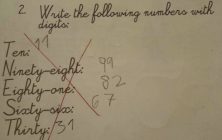In Smartick we are clear about the convenience of children to dominate math, feel comfortable solving problems and exercises, and even learn to “love mathematics.” But we also give a lot of importance to logic and reading comprehension, which is essential to the acquisition of new knowledge across all subjects. One of the most important milestones for school-age children happens when children move from learning to read to “reading to learn.”

It is very important to avoid ambiguous statements so that children can interpret them in a correct and clear way. In the example above, we can see how the statement can lead to confusion. You can understand what the teacher intended (since the exercise is marked as incorrect): write these numbers numerically. Or the natural interpretation of a student: write the digits of the number that comes right after it in the list.
To avoid these situations at Smartick, we count on a great team of teachers and educators who take care in writing the exercises and problems, and adapting them to all ages so that there is only one possible answer despite all the ”tricks.” Often statements are complicated on purpose, making it a basic skill for a child to correctly understand what they are being asked.
There are many studies that reveal the relationship that exists between certain linguistic aspects and mathematic abilities. The teaching of mathematics goes through building meaningful contexts so that children begin a process of reflection, mentally representing a situation, and understanding any type of text.
At Smartick we work with all types of problems statements. Some are destined to be solved using strategies and algorithms that have been learned while others aim to improve understanding of the statement. We offer data unnecessary for solving the statement, questions about the absence of any data, or questions whose answer is not numerical. We also have alternative problems, centered on the reflection process to understand the situation at hand.
Some experts praise our online math method which asks problems that have no solution, or whose correct answer can be ”I do not have enough data to solve this problem.”
In short, at Smartick we encourage the acquisition of mathematical knowledge in little ones, as well as reading comprehension and critical thinking. With these skills, they will be able to successfully face challenges both academically and in life.
If you want to try our method for free, register with Smartick and see for yourselves the progress of your children.
Learn More:
- Alternative Word Problems at Smartick
- Math Problems: Selecting Relevant Information
- Better Reading Comprehension Leads to Better Math Comprehension
- Math Problems with Data Tables
- Word Problems: Levels of Difficulty in Mathematical Language
- Master Math! 10 Reasons to Help Your Child do Just That - 05/28/2020
- Why Do Children Believe That Things Happen? - 05/25/2020
- Is Self-Control Linked to Health? - 05/19/2020







